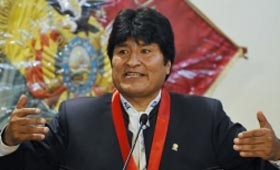As President Evo Morales defended the traditional use of coca leaves on the international stage, Bolivia is putting seized coca to legal uses instead of destroying it.
Speaking at the 55th session of the United Nations Commission on Narcotic Drugs in Vienna on Monday, President Morales continued his campaign to raise global awareness of coca chewing as a traditional practice.
Holding up a coca leaf to illustrate his point, the Bolivian leader called on the international communities to correct the “historical error” of including coca in the list of illegal narcotics in the 1961 UN Single Convention on Narcotic Drugs. “The producers of coca leaves are not the drug mafia,” said Morales. “The consumers of coca leaves are not drug addicts. Coca leaves in their raw state are not cocaine.”
Bolivia withdrew from the 1961 Convention in December in accordance with the Morales administration’s “Coca Yes, Cocaine No” approach to combating drug trafficking in the country. They subsequently announced they were seeking re-entry into the Convention, albeit with a reservation recognizing licit coca use.
In another sign of the country’s unorthodox drug policy, Bolivian Deputy Minister of Coca Dionisio Nunez announced this week that the government would re-use two million pounds of illegally-produced coca instead of burning it as is customary. The minister told reporters that the coca, which had been seized in various anti-narcotics operations in recent months, will be used for compost and other industrial purposes.
Nunez also said that the government reached an agreement with a local university to turn 10,000 pounds of the leaf over for a series of studies on its nutritional and medical properties.
InSight Crime Analysis
Morales’ international campaign has been met with strong opposition from US and UN officials alike. In a press conference following the meeting, UN Office on Drugs and Crime head Yury Fedotov again raised concerns over Bolivia’s efforts to remove coca from the list, saying it could undermine international anti-narcotics norms by creating a “domino effect.”
Although the Morales government has announced its intent to rejoin the 1961 Convention, they will have to wait a year before they can be readmitted. This period will be used by signatory nations to decide whether they will accept Bolivia’s qualified re-entry. If one-third of the total 183 voice formal opposition to it, Bolivia will not be allowed to rejoin under its proposed conditions.
The likelihood of this happening is unclear. While the US has said it will not campaign against Bolivia’s readmission, it has not disavowed any plans to vote against it. If the US does cast its vote against Bolivia, this will no doubt encourage other signatory nations to do the same.

